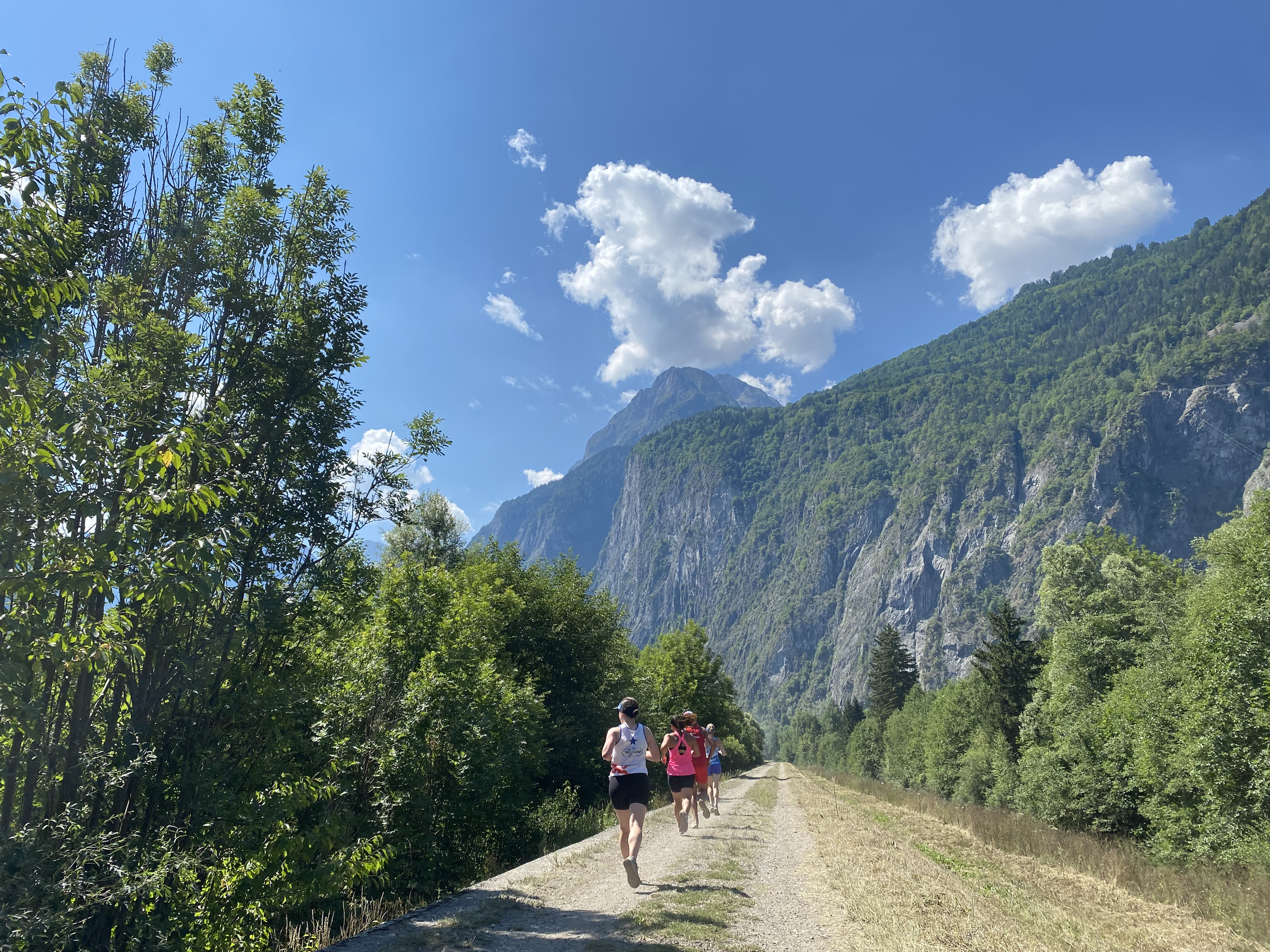Why do I struggle to push myself in a triathlon?
In this article, coach Philip looks at our ability to "dig deep" and how we can nurture it and become better and what many people call "mental toughness" as he explores why some people find it hard to push themselves in a race.
"Just remember, when you get to the point you don't think you can continue any further, and your mind says "stop". Just go faster – I'll be here to put your body back together if it is actually broken."
These were the words of my long-time friend and physio/personal trainer when I used to race: Paul Ledger. I think they were meant to instil confidence. However, the advice has stayed with me for a long time. Your mind will tell you your body is breaking down long before it breaks down. The reality is that your mind is giving you a choice: to push on or to stop. This article will look at that dark point in your race when facing that choice.
Racing will always present us with the raw truth of ability, and you will likely have one of three outcomes. A stand-out performance which was miles better than you believe it was, a terrible performance where you underperformed, or a race which more or less goes to plan. These outcomes will have a similar key point in the reflection. "My legs felt fantastic, and I went with it." or, "I just didn't have it today". Physiologically there could be a difference. Sometimes we do or don't "turn up". Nevertheless, whether we are here to compete or complete is still a conscious decision. Let's explore that a little more.
Endurance sports are quite literally a competition to see who can withstand a relatively easy (sub-maximal) pace the longest. However, as we all know, holding your marathon pace seems simple at mile 2 (Sometimes too simple!), but it is later on at mile 22 when our legs feel like they are stuck to the tarmac, and we can't go any faster.
Studies look into how much that feeling of fatigue contributes to stopping versus the physiological reasons to stop also side with Tim Noakes' Central Governer theory: our brains stop us before our body actually will give up. Furthermore, it is interesting that the same brains will choose to give up earlier if they are mentally fatigued. We are beginning to make the picture a little clearer. A tired brain will make us feel more tired than we physically are. Physical, cognitive and emotional pressures can impact 'brain tiredness'. To "dig deep", we must get ourselves into a state which avoids those influences. Part of that will come down to fueling and hydrating well. This will give you a better chance to be more positive. Think about the phrase "Hangry" – don't expect excellent mental overrides if you are training hungry (or thirsty), so get these basics right. It means you can focus on the more challenging parts!
Many people enter a race expecting it to be easy or, at least, easier than training. This expectation catches people out. The following example by Daniel Simons and Christopher Chabris highlights expectation really well:
If you don't know about this 1999 study, watch the video above before going further.
In the same way, if we expect that it will be easy, we won't be ready for that point in the race when it becomes hard – we will be blindsided. If I tell you I am going to push you, brace yourself, your physical response will be different to if I just pushed you without you expecting it. The outcome is very different too. The same is true in endurance racing. You need to be ready because you will have to suffer at some point.
In the same way as preparing yourself for a push (if the push is still stronger than you were expecting, you will fall over), you want to build your tolerance for suffering. This is achieved in training every day over a series of days, weeks, months or even years. The phrase micro-quitting refers to those small momentary acceptances of a change in the plan for a "good reason". It may be not doing the last rep because you are tired, hitting snooze and not doing a complete workout, missing a physio exercise session, or skipping the cool down because it doesn't matter. Every time you permit yourself to quit is a missed opportunity to work on your mental toughness. Because your ability to be mentally strong on race day is not a skill like self-talk or imagery, it is down to preparation (knowing it will come) and falling back on your training. If your training reinforces getting back up one more time, digging deep when the going is tough, your tolerance will be higher. It won't stop your brain from asking you the question (that will always happen), but it will mean you are probably deeper than you would have been, or you are further down the course. It also means you have more learned experiences of telling your head to shut up, which will lead to a more positive race outcome. If this happens, you get closer to that moment in the race we all love – the point where you know you have "got this".
For some, the finishing spurt may be at the start of the red carpet, the top of the last climb, or for others, with a set amount of distance or time to go. Everyone is different, but for all world records lasting longer than 3 mins, the final lap is always faster than the penultimate. The same is true with time motivators (dipping under 3 hours, 4 hours etc. in a marathon. We can all hit that point; people who have better races can do it from further out: "I only have a marathon to go...!". It is a bit like golfers. Professional golfers have a better short game (play near the flag or green) than amateurs for two reasons – one, they are better at chipping, and their margin for error is greater because their ability to putt the ball is better. An amateur may have a high probability of holing a 2-foot putt, but this may be the same as a professional at 10 feet. Athletes who are deliberately practising not micro-quilting in the hard sessions may find that their "range" improves too.
In summary, digging deep is a learned skill, but not in the way you may think. You have the opportunity to practice it daily, and these small acts of fortitude accumulate to create a mentally tough athlete in a race. Prepare for those moments at every opportunity and reflect on them when they happen. These will all make it easier to use self-talk to work through those challenging moments in a race (that you know will happen) and get to the point when you know the finish line is in reach. If you find yourself micro-quitting in training, then there is probably a factor impacting you: you will be fatigued (it is training), but this additional fatigue could be emotional, cognitive, fuelling or even an inappropriate training plan. Use this information to set realistic opportunities to practice mental toughness and build momentum. If it isn't working, listen to your body, it will be a sign you need to back off and give yourself time to recover, rest and go again.

Philip is the founder of Tri Training Harder LLP. He’s a British Triathlon Level 3 coach, and has been coaching for over a decade and is involved with mentoring and developing other coaches.
Philip has have coached athletes to European and World AG wins, elite racing, many Kona qualifications, IRONMAN podiums and AG wins.
Alongside the conventional development through many CPD courses, he has also been fortunate enough to work alongside experts in the fields of Physiotherapy, Strength and Conditioning, Nutrition, Psychology, Biomechanics, Sports Medicine. Putting this knowledge into practice he has worked with thousands of athletes to various degrees, from training camps in Portugal and around Europe, clinics in the UK and online coaching.
Visit Philip's
Coach profile
We’re here to help
Tri Training Harder are one of the leading Triathlon coaching providers in the UK, using our wealth of experience to unite scientific and technological research with already well-established and successful best practices, to create a formula for triathlon and endurance coaching that works.
The result is an honest, dynamic, yet simple new way of constructing an athlete’s training to allow them to reach their potential.
If you’re planning your next season, just starting out in the sport or are looking for extra guidance at the very top end of the field, we are here to help, and our coaches would be delighted to hear from you. You can contact us via the website, and one of the team will be in touch.

